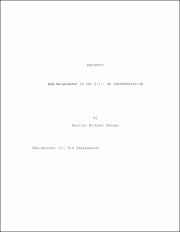Skia Ton Mellonton in Col 2:17 : an interpretation
Abstract
This study explores the meaning of Skia Ton Mellonton“a
shadow of things that were to come” within the calendric
text of Col 2:16,17. The grammatical and syntactical
difficulties in this passage have generated interest but
this phrase in particular is scarcely explored. This study
uses the grammatical/syntactical method of exegesis with
linguistic analysis to elucidate the meaning of this clause.
Since the clause is used with reference to the
religious calendric text that enumerates various appointed
times (festival, new moon and Sabbath), exploring the use of
the biblical religious calendric texts is necessary as a
first step in the process. This is explored within the
context of the Jewish heritage. Chapters 2 to 5 are
dedicated to assessing the background to Col 2:16,17, and
evidence points to a Jewish and Old Testament background.
This is an important finding since most scholars offer a
syncretistic reading and subscribe to the Platonic
background of Col 2:16,17.
The exegetical/syntactical study and the
linguistic/typological analysis offered in this study
yielded a reading that relates the sacrifice of Christ as
the antitype to the type, the sacrificial system which is
“the shadow of coming things” (Col 2:17a). A theological
analysis also confirms this reading.
This study concludes that the “shadow of coming
things” (Col 2:17a) refers to the sacrificial system rather
than the appointed times. The “body” of Christ (Col 2:17b)
refers to the physical body of Christ offered as a
sacrifice. Therefore there is a typology implied in Col
2:17. The typology is used by the author to resolve a
theological tension that builds up between the Jewish
opponents who are steeped in the Jewish tradition and the
Jewish and Gentile Christians who are committed to Jesus
Christ.


